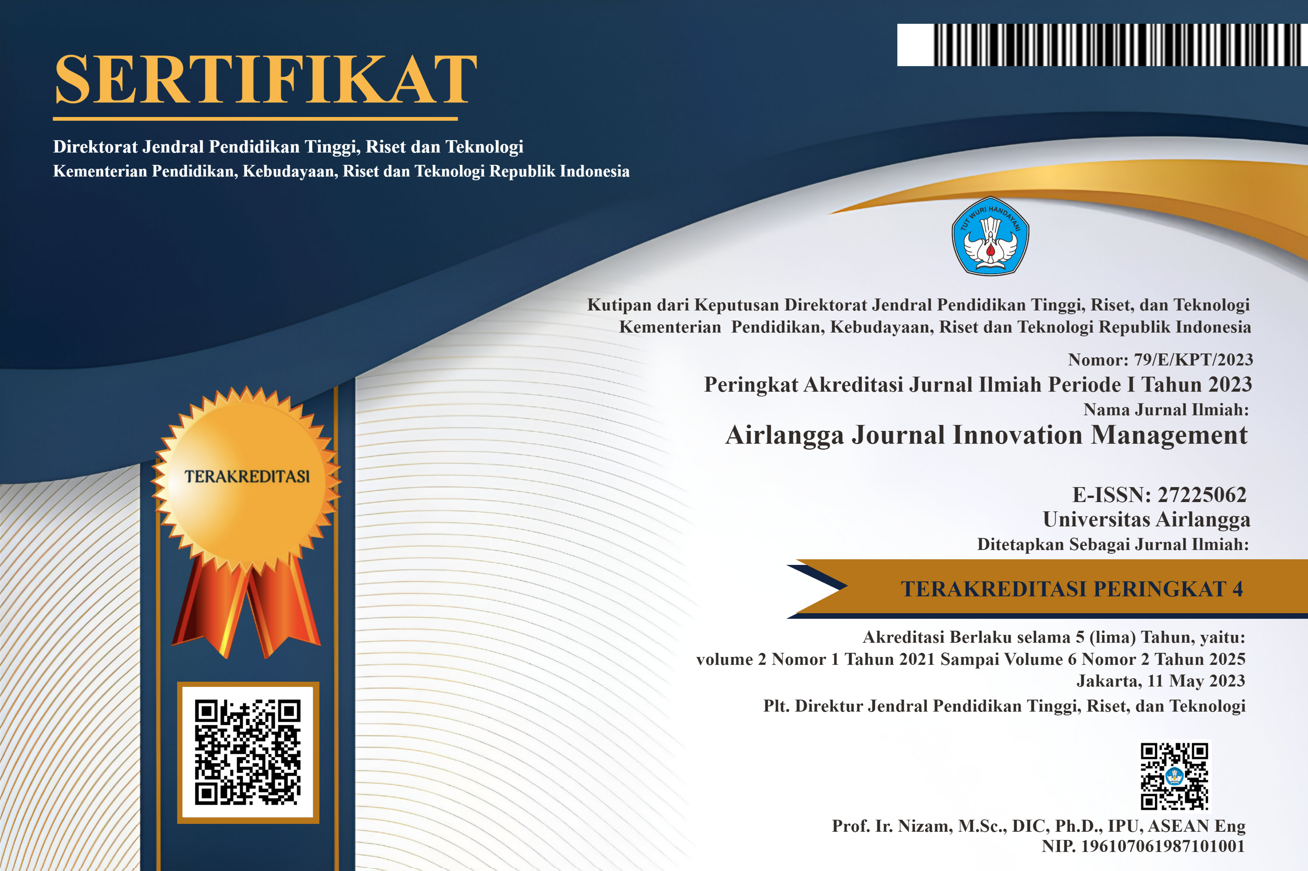Navigating Islamic Investments: The Role of Islamic Financial Literacy, Religiosity, and Motivation using PLS-SEM
Downloads
Along with the increasing number of investment transactions which continued to soar until the end of 2023, the Islamic Capital Market is additionally playing its role in improving the economy in Indonesia, especially for Muslims who want to carry out investment transactions within the Sharia corridor. This research aims to find out whether Islamic financial literacy, religiosity, and investment motivation significantly influence on investment intention in the Islamic Capital Market with a case study of Muslims in Bogor. The object is chosen Bogor is one of the largest Muslim regions in West Java, as the province itself is the top ten largest Muslim community in Indonesia. The results of research using SEM-PLS (Structural Equation Model Partial Least Square) show that Islamic financial literacy has no significant effect on investment intention in the Sharia Capital Market as the T-Statistic is being rejected (0.524 > 0.05), but religiosity (0.001 < 0.05) and investment motivation (0.000 < 0.05) are proven to have a significant influence on investment motivation in Sharia Capital Market as the T-Statistics are being accepted. However, this study complements previous research differentiating the research scope and summoning some variables that was used in the previous research. Religiosity is measured by the respondent's consideration of Islamic law in investment institutions, while investment motivation means the respondent's desire to fulfill their physiological needs, sense of safety needs, social needs, esteem needs, and self-actualization needs.
Febriyanti, A. R., Ratnasari, R. T., & Wardhana, A. K. (2022). The Effect of Economic Growth, Agricultural Land, and Trade Openness Moderated By Population Density on Deforestation in OIC Countries. Quantitative Economics and Management Studies, 3(2).
Ghifara, A. S., Iman, A. N., Wardhana, A. K., Rusgianto, S., & Ratnasari, R. T. (2022). The Effect of Economic Growth, Government Spending, and Human Development Index toward Inequality of Income Distribution in the Metropolitan Cities in Indonesia. Daengku: Journal of Humanities and Social Sciences Innovation, 2(4), 529–536.
Juliana, J., W. Mahri, A. J., Salsabilla, A. R., Muhammad, M., & Nusannas, I. S. (2023). The determinants of Muslim millennials' visiting intention towards halal tourist attraction. Journal of Islamic Accounting and Business Research, 14(3), 473–488. https://doi.org/10.1108/JIABR-02-2021-0044
Kasri, R. A., Haidlir, B. M., Prasetyo, M. B., Aswin, T. A., & Rosmanita, F. (2020). Opportunities and Challenges in Developing Islamic Pension Funds in Indonesia. Etikonomi, 19(2), 311–322. https://doi.org/10.15408/etk.v19i2.16284
Kasri, R. A., & Ramli, U. H. (2019). Why do Indonesian Muslims donate through mosques?: A theory of planned behaviour approach. International Journal of Islamic and Middle Eastern Finance and Management, 12(5), 663–679. https://doi.org/10.1108/IMEFM-11-2018-0399
Khan, A., Arafat, M. Y., & Azam, M. K. (2022). Role of halal literacy and religiosity in buying intention of halal branded food products in India. Journal of Islamic Marketing, 13(2), 287–308.
Khan, N., Sarwar, A., & Tan, B. C. (2020). Determinants of purchase intention of halal cosmetic products among Generation Y consumers. Journal of Islamic Marketing. https://doi.org/10.1108/JIMA-11-2019-0248
Loestefani, V., Poan, R., Suwitorahardjo, B., & Wardhana, A. K. (2022). Service Quality and Product Quality as An Influence on Customer Loyalty at Naturalis Koffie. FIRM Journal of Management Studies, 7(2), 211–236.
Lusardi, A. (2019). Financial literacy and the need for financial education: evidence and implications. Swiss Journal of Economics and Statistics, 155(1), 1–8. https://doi.org/10.1186/s41937-019-0027-5
Mendo, A. Y., Singh, S. K., Yantu, I., Hinelo, R., Bokingo, A. H., Dungga, E. F., Juanna, A., Wardhana, A. K., Niroula, B., & Win, T. (2023). Entrepreneurial leadership and global management of COVID-19: A bibliometric study. F1000Research, 12(31), 31.
Muflih, M., & Juliana, J. (2020). Halal-labeled food shopping behavior: the role of spirituality, image, trust, and satisfaction. Journal of Islamic Marketing. https://doi.org/10.1108/JIMA-10-2019-0200
Pratiwi, A. C., Wardhana, A. K., & Rusgianto, S. (2022). Application of Vector Error Correction Model on Macroeconomic Variables toward Changes in the Composite Stock Price Index. Daengku: Journal of Humanities and Social Sciences Innovation, 2(2), 219–229.
Purnamasari, K., & Ramayanti, T. P. (2020). The Effects of Macroeconomic and Bank Specific Factors on Nonperforming Financing in Sharia Commercial Bank in Indonesia. Global Review of Islamic Economics and Business, 7(2), 81–90.
Qosim, N., Ratnasari, R. T., Wardhana, A. K., Fauziana, H., & Barkah, T. T. (2023). Eight Years of Research Related to the Green Sukuk in the Global Stock Exchange Market to Support the Implementation of SDG: A Bibliometric Review. Journal of Islamic Economic and Business Research, 3(2), 161–180.
Rahman, A., Ahmad, A. U. F., Bin-Nashwan, S. A., Muneeza, A., Abdul Halim, A. H., & Markom, R. (2023). Policy approach adopted for issuance of Green Sukuk: is priority given to priority needed areas? Journal of Islamic Accounting and Business Research.
Rahman, I., Ratnasari, R. T., & Wardhana, A. K. (2022). Effect of Certificate of Bank Indonesia Sharia and Indonesian Bank Seven Days Repository Rate to Inflation Ratio in Indonesia During Covid-19 Pandemic. Economic Education and Entrepreneurship Journal, 5(1), 157–174.
Rosyadah, K., Mus, A. R., Semmaila, B., Chalid, L., & Budiandriani. (2022). Open Access The Relevance of Working Capital , Financial Literacy and Financial Inclusion on Financial Performance and Sustainability of Micro , Small and Medium-Sized Enterprises ( MSMEs ). 216(4), 203–216.
Ryandono, M. N. H., Mawardi, I., Rani, L. N., Widiastuti, T., Ratnasari, R. T., & Wardhana, A. K. (2022). Trends of research topics related to Halal meat as a commodity between Scopus and Web of Science: A systematic review. F1000Research, 11(1562), 1562.
Ryandono, M. N. H., Permatasari, S. A., & Wijayanti, I. (2019). Business behavior in an islamic perspective: Case study of muslim woman entrepreneurs in Ikatan Wanita Pengusaha Indonesia (IWAPI). 12th International Conference on Business and Management Research (ICBMR 2018), 154–159.
Ryandono, M. N. H., Wijayanti, I., & Kusuma, K. A. (2020). Determinants of Investment In Islamic Crowdfunding. Muqtasid: Jurnal Ekonomi Dan Perbankan Syariah, 11(1), 70–87.
State of the Global Islamic Economy Report. (2023). State of the Global Islamic Economy Report. In DinarStandard.
Trisno, B., & Vidayana. (2023). Understanding herding behavior among Indonesian stock market investors. E3S Web of Conferences, 426. https://doi.org/10.1051/e3sconf/202342601088
Wardhana, A. K. (2021). THE IMPACT OF THE PRO AND CONS POLICIES IN JOKOWI ERA'S ON THE MACRO ECONOMY OF SOCIETY. Jurnal Ekonomi Dan Bisnis Airlangga, 31(2), 124–136. https://doi.org/https://doi.org/10.20473/jeba.V31I22021.124-136
Wardhana, A. K. (2022). JANJI (WA'AD) SEBAGAI JARING PENGAMAN PADA TRANSAKSI KEUANGAN DAN BISNIS SYARIAH. Jurnal Keislaman, 5(1), 124–132. https://doi.org/https://doi.org/10.54298/jk.v5i1.3412
Wardhana, A. K., & Ratnasari, R. T. (2022). Impact of Agricultural Land and the Output of Agricultural Products Moderated with Internet Users toward the Total export of Agricultural Product in Three Islamic South East Asian Countries. Iqtishodia: Jurnal Ekonomi Syariah, 7(2), 11–20.
Wardhana, A. K., Ratnasari, R. T., & Fauziana, H. (n.d.). ISLAMIC INVESTMENT IN INDONESIA BEFORE AND DURING PANDEMIC OF COVID-19: A BIBLIOMETRIC STUDY INVESTASI SYARIAH DI INDONESIA SEBELUM DAN SELAMA PANDEMI COVID-19: STUDI BIBLIOMETRIK.
Wijayanti, I., Herianingrum, S., & Ryandono, M. N. H. (2020). Islamic Crowdfunding Mechanism to Answer Renewable Energy Investment Challenge in Indonesia. Test Engineering and Management, 83, 3596–3605.
Wijayanti, I., & Ryandono, M. N. H. (2020). Zakat institutions' mustahiq transformation in developing countries: Comparison study. Opcion, 36(S26), 350–366.
Copyright (c) 2024 Airlangga Journal of Innovation Management

This work is licensed under a Creative Commons Attribution-NonCommercial-ShareAlike 4.0 International License.
- The journal allows authors to hold copyright without restrictions and retain publication rights without restrictions. The author retains the copyright and grants the first publication rights to the journal, with his work simultaneously licensed under the Creative Commons Attribution-NonCommercial-ShareAlike 4.0 International License (CC BY-NC-SA). This license allows others to share the work with acknowledgment of authorship and initial publication in this journal, provided that the work is not used for commercial purposes and that any derivative works must use the same license.
- Authors may enter into additional contractual agreements for non-exclusive distribution of the journal publication version (e.g., uploading it to an institutional repository or publishing it in book form), while still including acknowledgment of the initial publication in this journal.
- Authors are allowed and encouraged to upload their work online (e.g., in an institutional repository or personal website) before and during the submission process. This can support productive scientific exchanges as well as increase citations to published works.

AJIM by UNAIR is licensed under a Creative Commons Attribution-NonCommercial-ShareAlike 4.0 International License.





















